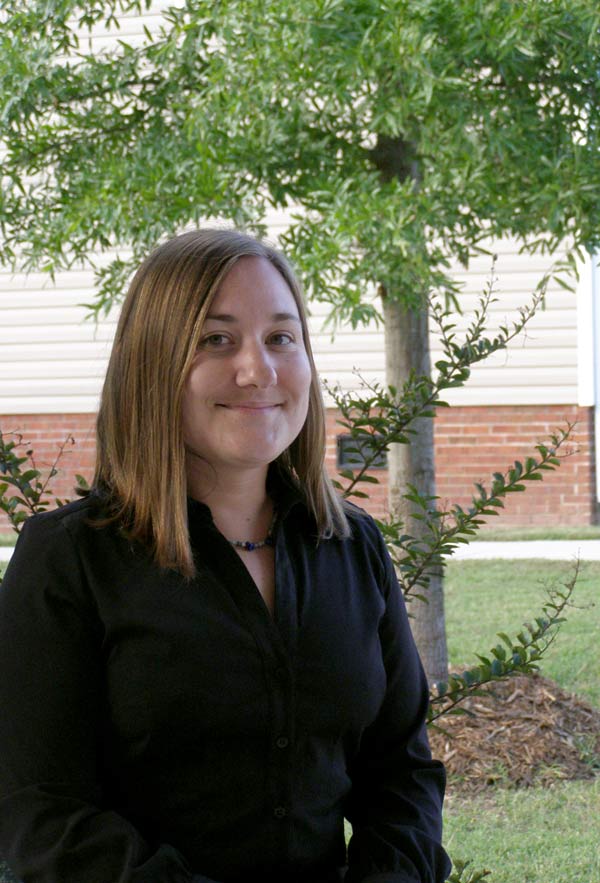By Julian March
UNC Staff Writer
The Durham Voice
In the main office of Triangle Residential Options for Substance Abusers (TROSA), Robyn Duff comfortably handles paperwork on her desk and talks on the phone. She’s sharply dressed and has a ready smile. Someone has called with good news, and you can hear the excitement in her voice.

Robyn Duff has come to appreciate the grounds where TROSA is headquartered. Sept. 19, 2009 was her three-year mark for staying clean.
Duff is the assistant to the Kevin McDonald, the president and founder of TROSA. But when she first came to the Durham center, she was a patient.
Her journey to TROSA began in college, when she says she began drinking her freshman year.
After she left college, she began seeing doctors to treat her anxiety and depression. She was prescribed Xanax.
“I immediately became addicted to that,” she said. She also abused Ativan and kept drinking alcohol while she was on the prescription medications.
Over time, she began smoking marijuana. She was moving to more severe substances.
“It just kept moving on and on and on,” she said.
She owned a home in Youngsville in Wake County and worked for a large nonprofit. But then she began to snort cocaine.
“I snorted for about six to eight months,” she said.
She switched to smoking crack cocaine. She said snorting lasts longer, but the crack cocaine is more intense. She said crack cocaine is cheaper, but it goes faster.
“It’s just highly addictive,” she said.
She stopped paying bills as more and more money went to the addiction.
She finally decided to go to a rehabilitation center. She spent nine days in a detox, then went to a Wilmington, N.C. treatment center. After eight days, they kicked her out because that’s all her health insurance would pay for.
“I wasn’t ready to leave,” Duff said.
By the time she returned home, all of her co-workers knew she had been at a drug treatment program.
“I was too embarrassed to come back,” she said. So she quit.
She only stayed clean 30 days. She worked as a waitress, where she would only make $80 to $100 a day. When her car was repossessed, she spent about $60 a day on cab fare.
In July, her electricity was cut off. The mortgage was often late. She said she was “spending everything on the drugs.”
She started selling off her possessions. It started with big appliances, but then she started selling everything down to the lamps. She told neighbors she was selling items to downsize so she could move away. She says she would not have wanted to face the judgment if they knew the truth.
“Of course I wasn’t going to tell anybody,” she said.
She said she was two weeks away from homelessness when she came to TROSA.
“By the time people get here, they’ve been through a lot,” she said. Many of the residents have tried other programs that haven’t worked. Some, like Duff, may have had short stints in detox centers that did not address underlying problems.
Duff said she was surrounded by people just like her at TROSA. Only there did she begin the process of healing. She began to trust the program and the people in it.
“I was willing to let people know about me,” she said.
She said she used to be a quiet person who would follow others because she wanted to please them.
“That got me into a lot of trouble,” she said.
During the two-year program, she said she revealed fears and faced her own personality to find underlying anger.
She shared her story during a peer group game, which was first a 12-hour session and later a 24-hour session.
She points to TROSA’s motto: “Each one, teach one.” She says the residents support each other on the road to getting clean.
“I love to see more come in,” she said.
The grounds of TROSA, which is headquartered on James Street, are quiet. Pine trees surround the 13-acre campus, forming a natural protective wall. For the fall, pumpkins line the walkways and steps on a gazebo.
Kevin McDonald, who founded TROSA in 1994, said the program focuses on treating both mental illness and substance abuse. He said TROSA is designed as a second chance. People who go through the two year program do not have to pay a dime for their care.
“It’s about people,” he said.
“We give people scholarships to help change their lives.”